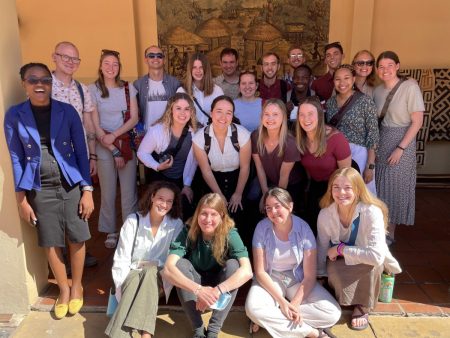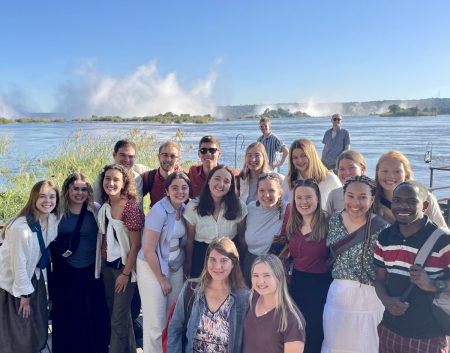
Hello from Livingstone! Today we had another busy schedule that continued to enlighten and challenge us. Again, we were encouraged to partake in genuine and, sometimes, difficult reflection, making our time here that more meaningful.
In the morning, after our lovely breakfast at Fawlty Towers, we participated in a guided tour at the David Livingstone Museum, just up the road from us. This tour was intended to last about two hours, but like any other valuable thing in life, it took time. More time than we initially gave it credit for. We left the museum four impactful hours later, and I was feeling both in awe and unease.
The tour included information on human evolution, cultural practices, Zambian history, and David Livingstone, a white, British missionary. He made three trips to Africa in his lifetime, passing away during his third, and eventually becoming the man that the city of Livingstone is named after. I came in with an expectation that David Livingstone, a colonizer, would be depicted with the same connotation that we hold for those individuals. However, he was held in a much more positive light. Not only is the museum named after him, but there is an entire section dedicated to him and his three excursions. For me, this was the beginning of a greater realization.
Throughout the entire tour, but especially David Livingstone’s section, our tour guide did an exceptional job providing the facts. She explained historical events, their effects, and the reactions met with them. And the level of knowledge that she shared – it left me speechless.
Multiple thoughts flew through my mind. First, there was not one point in the tour where I felt I was being told how to feel, or that information was not being shared. Yet, it also became clear the emotions held with each topic being discussed. We were receiving the truth – all the good, the bad, and everything in between. It was refreshing. Second, our tour guide was so incredibly knowledgeable of Zambian history. Granted, it is her job, but there was a uniqueness to the way she interacted with us and the history she presented that stood out as distinctly special.
At one point in the tour, we mentioned our upcoming journey to Zambezi, and her face lit up in response. She jokingly said, “take me with you!” this interaction was revealing in the fact that while we are having this spectacular opportunity to travel across the country, various Zambians do not have that same chance. But in no way are we any more deserving than our tour guide to have that experience. So, in that sense, it was a nice reminder of how privileged we are to see the things we’re seeing, and to feel the emotions we feel.
Leaving the museum, once the awe sunk in, I began to feel another realization. There has never been a point in my life where I could explain American history to the point our tour guide did. I simply do not know it well enough, nor have I carried a sense of urgency to thoroughly know it. But ironically, I believe that there is a significant importance on knowing history to grow from it – to learn from mistakes, and to celebrate the ways in which perseverance unfolds. Our tour guide provided a sense of pride for the history. I saw this pride especially when she was explaining the meaning of the Zambian flag. The colors – green, orange, black, and red – all represent something. Green for the agriculture, orange for the minerals, black for the black population, and red for the bloodshed spilled while fighting for independence. This importance for and pride of history shown by our tour guide fittingly manifests in her beautiful name, Memory.
This idea of being proud of one’s country is not foreign to me, nor would I say it is foreign to the rest of our group. However, I do believe there is a difference in what that means for us, especially in a foreign country. We all know the rude and ignorant American stereotype. We have seen it first-hand while we’ve been here – by other American travelers, and even ourselves, unintentionally. It is real, and it is something I expect our group to continuously tackle during our time here.
Later in our day, we made a trip to the Royal Livingstone Hotel, right on the edge of Victoria Falls. Here we had a traditional British High Tea with delicious sweets. On our way there, myself and seven others had a very genuine conversation with our van driver, Charlie. He spoke of his family, smiling with every word. He shared the importance of his grandmother, his Gogo, to him. He told us the wise advice she gave him when dealing with rude or inconsiderate customers, specifically American ones. Her advice was, “try to understand their perspectives and your life will be easier.”
I think it’s safe to say hearing that required a moment of thought afterwards. Such a simple sentence yet the intentionality behind it is so powerful. Taking that moment’s notice to try and understand one’s perspective, regardless of its connection to our own – it can change an interaction entirely for both parties.
Keeping that mentality in mind, we arrived at the hotel that is undoubtedly breathtaking and unlike anything most of us have seen before. The edge of the property is met with the rushing Zambezi River, Victoria Falls’ mythic mist is in sight, and animals such as giraffes, zebras, and impalas roam the grounds. The buildings were similar to ones in America, appearance wise. Honestly, it would be safe to say that we felt a form of familiarity when we were there. However, after that initial wave of excitement and wide-eyed curiosity, a few of us began talking about how the hotel did not even feel like the Zambia we have come to know so far.

After that, it became clear that staying in this hotel would mean easy access to a bubble that prevented any relationships with local cultures, locations, and people that have quite literally made our entire journey what it is thus far. What then, is the purpose of this hotel? To me, it did not feel like it was for the purpose of our trip – standing in accompaniment with others in which we are equally growing and benefiting; serving in tandem.
Then I thought of the museum and the conversation with Charlie. Memory showed so much excitement that we are going to Zambezi, unlike many other tourists who come. This is not to “pat us on the back” by any means, but to show the reality of the practice American tourism. It’s disappointing that it is not expected for Americans to want to know the culture, to want to immerse ourselves. And that disappointment is only amplified when asking Charlie if he experiences rude Americans often, and his answer is “yes.”
Our time here so far has introduced us to so many thoughts and emotions, but I feel that today has been the first day we’ve had to genuinely and directly address the implications involved with traveling as Americans. The assumptions about us our valid, but how do we challenge them? How do we serve in tandem when the expectation is us wanting to be served? I’m excited to find the answers to these questions, to tackle all the challenges, and to grow with the experiences.
Kiso Mwane, Eva Palmer (’23)

Hey Eva! I’m a random Zambezi Alum who appreciated your post. What does it mean to be an American? Tough question with some hard realities that I’m still grappling with. The baggage of that identity takes on a completely different form in Zambezi than it does in downtown Livingstone that it does at the Royal Livingstone than it does in Spokane. So, thank you for your thoughtful reflection! That is such a rich part of the Zambezi experience; Re-configuring our understanding of the many facets of our identity!
Also, SO excited to see that Michael is in college! When I was there (2019), he was working day in/day out at a cell phone-minutes kiosk outside of the Zambezi market. He had his whole life-plan all laid out, but was just waiting to get his chance at college. Glad he finally has his shot and is thriving!
Mwane’s on Mwane’s,
Ethan Kane (’17, ’19)
Hi from another random Zambezi alum (2016!) that, like Ethan, still grapples with the hard parts of piecing together cultural identities that don’t typically pair well together. You nailed it – it is easy to build a bubble at high tea and avoid the point of this whole thing – life, studying abroad, cultural immersion, the small moments for conversations that take place in vans…. And this is a great moment to experience this early on and keep in focus through this journey.
Sending you blessings,
-Matt Clark
Ps. Jeff and Abbey, what joy I feel knowing that you two are together in such sacred space again – reminiscing fondly on many many long trips with goats and chickens together and asking difficult questions with very easy answers, that still drive and shape who I am today. I cannot wait to share campus with you again in the fall. Kisu mwane dear friends.
Your thoughtful and descriptive posts are really helping us feel connected to your whole experience. It is wonderful how you are absorbing the cultural nuances.
You’ve inspired us to watch Fawlty Towers tonight! 🙂 News from home: Gortners’ new Golden Lab puppy, Cleo, arrived!
Hello Eva,
Thank you for your reflection. I respect that the group is being challenged of what being American means and how we can become more aware of our privilege. I look forward to reading everyone’s experience and adventures. My continuous prayers for everyone!
Newson Family
I’m enjoying following this interesting and important trip.
Eva and Josh
Hello:) we miss you.
Beautifully written. Keep leaning in!
Hi Jazmine! Miss you loads! <3
Good morning, Eva! Thank you for your
introspective thoughts and feelings about your experiences. What a great opportunity you have to learn about a totally different culture and integrate it all into your world view. Every culture needs more light, so let yours shine wherever you are! Praying for God to direct every aspect of your trip.
Eva. Thanks to you and your classmates for this post. It is heart warming to read about your thoughts and open discussions on not only Zanbezi but US history as well. We hope you get to experience and enjoy as much of their culture as you can. Blessings and safe travels to you all.